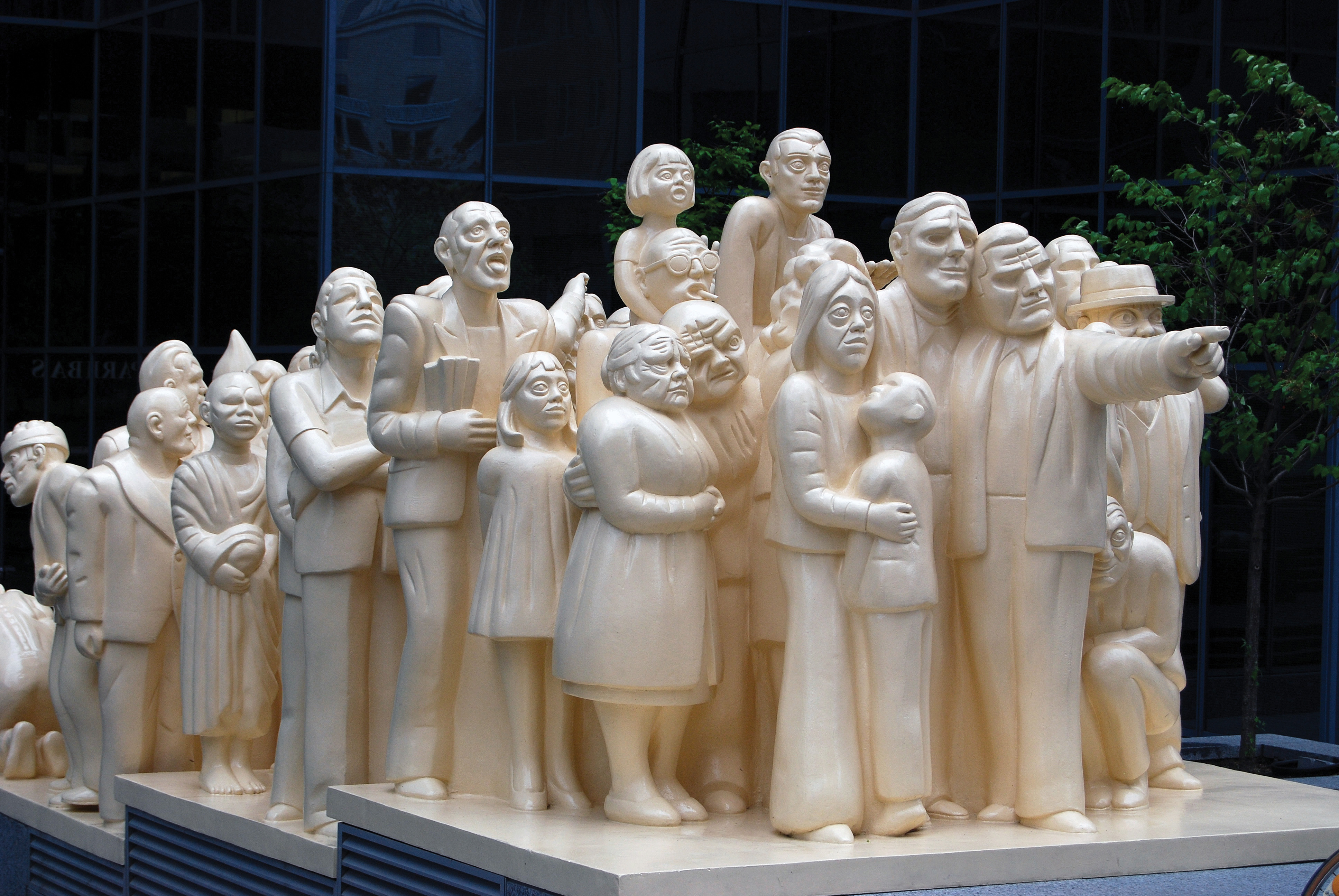
Source: Photo courtesy of David Goehring, http://www.flickr.com/photos/carbonnyc/99785459/.
Football coach Joe Paterno’s on-field prowess is only slightly more legendary than his sharp tongue. This is one crowd favorite: “If I ever need a brain transplant, I want one from a sports writer because I’ll know it’s never been used.”Mike Bianchi, “Panthers Gm Proves Paterno Barb Wrong,” Orlando Sentinel, January 31, 2004, accessed May 31, 2011, http://articles.orlandosentinel.com/2004-01-31/sports/0401310276_1_sports-writer-silly-stuff-recruiting-visits.
Most people find this to be pretty funny. And though it rubs some sports writers the wrong way, no one is going to file a lawsuit or claim antidiscriminatory protection is needed to protect the offended. On the other hand, JoePa—as he’s called around Pennsylvania—himself suffered taunting as a younger man. People called him a “wop,” a slur attacking someone’s Italian heritage (like the more common “guido” or calling a Chinese person a “Chink”).

Source: Photo courtesy of Tim Schapker, http://www.flickr.com/photos/albany_tim/3536902765.
This comes from the Columbia University website: “As an equal opportunity and affirmative action employer, the University does not discriminate against or permit harassment of employees or applicants for employment on the basis of race, color, sex, gender (including gender identity and expression), pregnancy, religion, creed, national origin, age, alienage and citizenship, status as a perceived or actual victim of domestic violence, disability, marital status, sexual orientation, military status, partnership status, genetic predisposition or carrier status, arrest record, or any other legally protected status.”“Office of Equal Opportunity and Affirmative Action,” Columbia University, accessed May 31, 2011, http://www.columbia.edu/cu/vpaa/eoaa.
What’s the difference between unintentional and intentional discrimination?
Hypothetically, John Smith has applied for a maintenance post at Columbia. The job entails routine and emergency plumbing and fixing of general problems, everything from burned-out lightbulbs to graffiti. More or less, the job is to walk around and make sure things are in working order. He’d be working the night shift from 11 p.m. to 7 a.m. His assigned buildings would be a classroom and three coed dorms. He has been arrested three times for attempted rape of young women, but there was never enough evidence to convict.
Columbia won’t discriminate on the basis of religious belief. Historically, some creeds have been singled out more than others for abuse, but one that’s not often found on the list of mistreatment is Haitian Voodoo. Houngan Hector of New Jersey identifies himself as an asogwe priest of Haitian voodoo. His story is interesting. He claims to have been “mounted” by an ancestor at the age of seven, and so began his spiritual journey. Eventually, it led Houngan Hector to perform spiritual cleansings for money. They haven’t always gone well. According to this newspaper story in the Philadelphia Daily News: “Lucille Hamilton paid $621 to have her ‘spiritual grime’ removed by voodoo high priest Houngan Hector in an ordinary townhouse in Camden County. Hamilton, 21, a male living as a woman, flew in on Friday from her home in Little Rock, Arkansas to take part in the three-day spiritual cleansing. By Saturday night Hamilton was dead, and authorities are awaiting results of an autopsy and toxicology tests to determine exactly what happened.”“Transvestite Dies At Voodoo Ceremony,” OddCulture, accessed May 31, 2011, http://oddculture.com/culture/transvestite-dies-at-voodoo-ceremony.
Here’s Houngan Hector’s advertisement for his services on his MySpace page, as it was reported in OddCulture: “I have over 15 years of experience helping individuals resolve their issues, and well over 9 years of helping people through the means of the Haitian Voodoo tradition. Having gotten individuals out of jail, brought lovers back, and improved people’s financial situation, I keep myself humble remembering it is not I who does it. It is God and Ginen who resolves.”“Transvestite Dies At Voodoo Ceremony,” OddCulture, accessed May 31, 2011, http://oddculture.com/culture/transvestite-dies-at-voodoo-ceremony.
The three basic ethical arguments against discrimination (and, in this case, discrimination based on personal religious belief) are fairness, rights, and utilitarianism.

Source: Photo courtesy of Richard Rutter, http://www.flickr.com/photos/clagnut/46815739.
Susan Rieger heads Columbia University’s Office of Equal Opportunity and Affirmative Action, and she has a tough case with Randy Raghavendra. He’s an analyst at Columbia’s Office of Institutional Real Estate who got passed over for a promotion. The spot went to a younger white woman. Raghavendra, who’s a dark-skinned Indian American, accused that “Columbia practices blatant racial discrimination and various deceptive tactics to keep out blacks and other dark-skinned minorities from higher-paying managerial and executive positions of power.”“NRI Sues Columbia University for Racism, Times of India, November 22, 2003, accessed May 31, 2011, http://businessethicsworkshop.com/Chapter_10/susan_rieger_in_trouble.html.
The case’s specifics go back and forth:
Raghavendra points out that when he interviewed for the promotion, it had already been given to the white woman. His interview, therefore, was a “joke,” as he put it, “a fake interview.” The university answered that the hiring for that post had been handled by an outside headhunting company, which was a common practice at Columbia.
Assume the outside company did engage in discriminatory practices. Does the fact that it’s an independent enterprise cleanse Columbia University of responsibility? Or is the university equally responsible? Or is it actually worse that they’re hiding behind an outside firm? Justify your answer.
An administrator at the university once asked Raghavendra, “Do you often get hassled at airport security?” The suggestion, according to Raghavendra, was that he looked like a potential terrorist. The administrator didn’t deny the comment but affirmed that the idea that it was racist was “bizarre” and “silly beyond belief.”
Raghavendra argues that he didn’t get his own office while several white workers in lower posts did have their own office as well as a separate mailbox. The university responded that office and mailbox space is distributed by seniority: the lower-level white workers who had their own office had worked there longer.
Seniority is viewed by most as a generally fair way of distributing offices. It’s also fair, according to common opinion, to divide them up in terms of rank. Would it be right or wrong, however, for Columbia to simply say that either of the two systems will be used interchangeably, but the choice will be made in terms of minorities: whichever system allots the best offices to minorities will be implemented? Justify your answer.
Raghavendra originally took his case to Susan Rieger, head of the Office of Equal Opportunity and Affirmative Action. After three months he withdrew it, however, claiming that they played games with him and never really investigated the charges. The university responded that he “failed to utilize internal administrative remedies provided by Columbia.”
Raghavendra is claiming that Columbia discriminates against him. As an employee of Columbia, does he have any ethical responsibility to try to work out the issue inside that organization? If so, what is the responsibility? As a member of society, does he have an obligation to take his claim outside the university? If so, what is the responsibility?
Raghavendra notes that there are no African Americans in higher-level positions in his office. There is a Pakistani who has a higher title, but Raghavendra points out “he’s not really that dark-skinned.”
Within the context of the ethics of discrimination, what does it mean to be a victim? What types of victimhood are there? Is there any reason to ask here whether Raghavendra might be one of these kinds of victims? If so, what is it? If not, why not?
What makes the case especially difficult for Rieger, the Columbia point person on all this, is that she’s trying to balance discrimination claims while fending off a lawsuit herself. Her post had been occupied—on a provisional basis—by Zenobia White-Farrell, a black woman. Columbia offered to make the job permanent with a salary of $80,000. White-Farrell responded that she’d accept but only on the condition that the salary was upped to $100,000. Columbia offered only $83,000. White-Farrell resigned. Soon after, Columbia hired Rieger at a salary of $107,000. White-Farrell sued, alleging discrimination.
Columbia University is an Affirmative Action institution. They aren’t satisfied with gender and racial neutrality; it’s the institution’s policy to promote and to some extent favor minority candidates for jobs.

Source: Photo courtesy of dichohecho, http://www.flickr.com/photos/dichohecho/2545363497.
This statement comes from Google CEO Eric Schmidt on the corporate web page titled “Google Celebrates Diversity”: “Our products and tools serve an audience that is globally and culturally diverse—so it’s a strategic advantage that our teams not only encompass the world’s best talent but also reflect the rich diversity of our customers, users, and publishers. It is imperative that we hire people with disparate perspectives and ideas, and from a broad range of cultures and backgrounds. This philosophy won’t just ensure our access to the most gifted employees; it will also lead to better products and create more engaged and interesting teams.”“Diversity@Google: A place to be you,” Google, accessed May 31, 2011, http://www.google.com/corporate/diversity/index.html.
This is a very carefully worded paragraph, and beneath its motivational tone there are firm statements about diversity in the Google workplace. They include the following:
There are also clear justifications for the diversity side of the hiring strategy. Google will take action to contract a rainbow of workers because
Concretely, what is Google doing to diversify the people forming its company? Besides directly hiring a diverse workforce, the company offers a number of scholarships and internships aimed at those historically underrepresented in the technology industry.“Diversity and students,” Google, accessed May 31, 2011, http://www.google.com/diversity/students.html.
In a nutshell, the commonly cited arguments in favor of affirmative action include the following:
Which of these arguments appear to stand behind affirmative action at Google? Explain. Are any of the other justifications applicable even though they may not be the reason Google seeks diverse talent?
In a nutshell, the basic arguments against affirmative action include the following:
Looking at this list, how do you suppose Google CEO Eric Schmidt might argue against each item?

Source: Photo courtesy of BY-YOUR-⌘, http://www.flickr.com/photos/aparejador/2482604806.
Madonna Constantine is a professor of psychology and education specializing in race studies and prejudice. Growing up as one of five children in a lower-middle-class family in Lafayette, Louisiana, she’d benefitted from parents who never finished college and vowed she would: they saved and scrimped together enough money to get her started at the upper level. Constantine took it from there. She began her remarkable journey at Xavier in New Orleans. Next, she went to the University of Memphis, and then to the University of Texas, and Temple University, and finally to the Ivy League’s prestigious Columbia, where she earned tenure with more than thirty articles authored and published: “Most people may go up for tenure with 15 or 20 articles,” she said. “I figured as a black woman, I needed at least double that.”Elissa Gootman, “Noose Case Puts Focus on a Scholar of Race,” New York Times, October 12, 2007, accessed May 31, 2011, http://www.nytimes.com/2007/10/12/education/12columbia.html?_r=1&pagewanted=all.
As it turned out, the numbers weren’t the whole truth. Constantine had plagiarized significant amounts of her writings from students and another professor. Upon discovering the truth, Columbia fired her. Constantine responded, “I am left to wonder whether a white faculty member would have been treated in such a publicly disrespectful and disparaging manner.”Karen W. Arenson and Elissa Gootman, “Columbia Cites Plagiarism by a Professor,” New York Times, February 21, 2008, accessed May 31, 2011, http://www.nytimes.com/2008/02/21/education/21prof.html.
Next, she sued Columbia for racial discrimination.
Columbia University is having a rough time: Randy Raghavendra, Zenobia White-Farrell, and Madonna Constantine are all suing the traditionally very white institution for color discrimination.